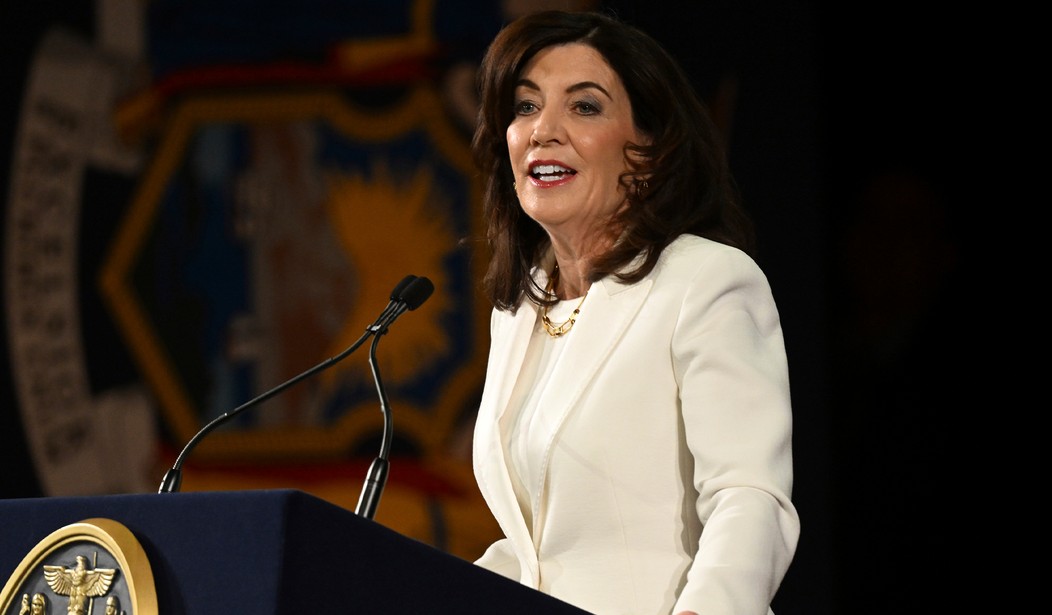If New York Gov. Kathy Hochul gets her way, the Empire State will become even more authoritarian than it already is. The governor is covertly floating the idea of imposing a ban on tobacco products. Right now, her office seems to be looking at ways to garner backing for such an idea.
Gov. Hochul is reportedly seeking support for a complete prohibition on the sale of tobacco products in the state. To gauge public opinion, the state Health Department commissioned a survey including questions regarding policies such as banning the sale of all tobacco products within 10 years or limiting sales based on birthdate.
The New York Post reported that the Hochul administration “is quietly trying to fire up support for a complete ban on the sale of tobacco products in New York.”
From the report:
The state Health Department commissioned a new survey aimed at gauging support for an all-out prohibition — despite Gov. Hochul’s failure to secure support from state legislators to include a ban on menthol cigarettes and other flavored tobacco products in the yet-to-be-approved state budget.
The survey, conducted by nonprofit research organization RTI International and distributed to community leaders statewide, also seeks input on other tobacco-related measures such as capping the number of retailers in a community and prohibiting sales near schools.
One of the questions asked what respondents’ opinions were regarding “a policy that would end the sale of all tobacco products in New York within 10 years.”
The study, which is titled “New York Local Opinion Leaders Survey,” also asked what respondents thought of a policy “that would ban the sale of all tobacco products to those born after a certain date.”
An insider confirmed that Hochul’s office is considering an “outright ban” on tobacco products.
Kent Sopris, who heads the New York Association of Convenience Store Owners was skeptical about such a policy. He speculated that it would “put many stores out of business” and would only prompt smokers to purchase cigarettes outside of the state or from the black market.
The survey was circulated among “county legislators and county directors of public health,” according to a memo drafted by Jennifer Lee, director of the Health Department’s Bureau of Tobacco Control.
This move comes after Hochul’s office considered enacting a ban on flavored tobacco products, including menthol. If this proposal passes, New York would become the third state to ban flavored tobacco products, including menthol cigarettes, flavored cigars and cigarillos, and flavored smokeless tobacco. This move is ostensibly aimed at tackling the exploitative marketing tactics of the tobacco industry, which has used flavored products to attract young people and target minority communities, leading to increased risks of death, disease, and lifelong nicotine addiction.
“I commend Governor Hochul for taking on Big Tobacco, which has exploited flavored tobacco to attract young people and target members of the Black and Hispanic community, increasing their risk of death and disease and a lifelong addiction to nicotine,” Acting State Health Commissioner Dr. James McDonald said. “The elimination of flavored tobacco products would safeguard our young people and those who have been addicted at alarmingly high rates as a result of the tobacco industry’s marketing efforts. We know that menthol makes tobacco products easier to start and harder to quit, and we look forward to working with the Legislature to pass this life-saving legislation.”
I’ll be blunt. Banning tobacco products is not only stupid, it is an authoritarian “solution” that would only make things worse for New Yorkers.
As Sopris said, such a policy would drive sales to the black market. Smokers who are unable to legally purchase tobacco products may turn to illegal means, such as purchasing cigarettes from illicit sources or smuggling them from other states. This will lead to increased illegal activities, such as smuggling, counterfeiting, and other criminal activities, as well as the potential for increased law enforcement efforts and costs associated with cracking down on illegal tobacco sales. Additionally, this could pose health risks to consumers, as the quality and safety of tobacco products may not be ensured.
When the state passes more laws, it creates more criminals. This will increase the likelihood of negative – and even deadly – interactions between law enforcement and the civilian population. One example is the case of Eric Garner, who was choked to death by a police officer who approached him because he was selling loose cigarettes on a street corner. Many focused on the behavior of the officers, but only a few questioned the validity of a law that prohibited an individual from selling cigarettes in public. If that law did not exist, it is unlikely that officers would have accosted him in the first place. This is the type of situation that will be created if New York’s government enacts such a law.
Moreover, this law will only distract law enforcement from addressing actual crimes that violate people’s rights. This will make the city less safe as resources are being taken away from violent offenders to police cigarettes.
Lastly, banning tobacco products is an infringement on personal freedoms and individual choices. While tobacco use is widely acknowledged to be harmful to health, adults have the right to make their own choices regarding their lifestyle and consumption habits. The state should not have the authority to tell us what we can put into our bodies. A complete ban on tobacco products would restrict the freedom of adults to make their own decisions about tobacco use, even if they are aware of the risks. This could be seen as paternalistic and may not be well-received by the public, potentially leading to backlash and resistance.
Hopefully there will be enough resistance to stop Hochul’s plan to make New York’s government more of a nanny state.














